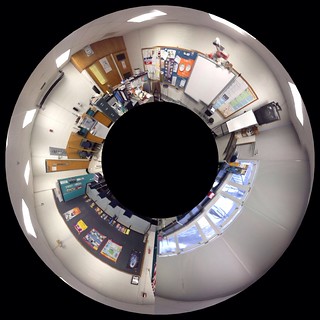
(a panoramic image of my sixth grade classroom)
The theme this week at the Deeper Learning MOOC is examining student work through the lens of critique. This is always important, and as it turns out, last Friday, we spent an entire Professional Development Day looking at, discussing and talking about a recent cross-district writing assessment. (Our district is regional, so there are four elementary schools, and all of our sixth graders come together at the middle school/high school level).
Now, there are things I don’t like about our process — including the use of rubrics that we did ourselves design and a few other things — but the fact that our school administration gave us an entire day as a grade-level team (there were 10 of us who teach sixth grade in the room, and similar meetings were happening with other grades around the building) looking very closely at student writing samples, and then spending a long time discussing what we were seeing … that really was priceless. We looked at structure, at voice, at syntax and grammar, and the development of an idea. We argued (politely) about what we saw and didn’t see, and listened to our colleague’s views on what they saw. Although we did not have a specific protocol for the critique (as suggested by DLMOOC), we did have the rubric to guide us and for all 10 of us to be looking at the same pieces of writing and talking on the same page is incredibly important.
We did not use this, but I like this resource out forth by the DLMOOC folks:
It was so much better than if our district had hired some outside consultant to talk to us about rubrics or assessment. The process valued us teachers as professionals, with knowledge and experience, and yet, diving deep into student work as a group is a very different experience than diving into student work as an individual. When I assess my students writing, I can’t shake what I know about these writers as people and I often discover that I reach a ‘groove’ with a stack of stories or essays, and in doing so, begin to lose a focus.
Assessing student writing is difficult work. Working with colleagues is valuable, even if the process is still a little bumpy. We found examplars and anchor papers from our work on Friday. These were collectively agreed upon, after long deliberations. Our fear is that this process stalls at some point — like you, perhaps, we’ve been inundated with initiatives that seem to vanish over time before they are completed — yet my hope is that writing remains in the focus of our work as a staff.
Going deeper with critique begins with a conversation.
Peace (in the deep),
Kevin